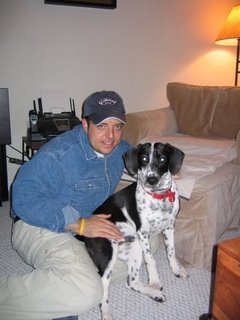Hello Friends ③ 前編
皆さん こんにちは!またまた、本ブログに、特別ゲストが来てくださいました。彼は、奥さまと一緒に “飼い主のいない犬達の里親”としてボランティアをしています。飼い主のいない動物達への里親制度は 日本ではまだ一般化していないように思います。アメリカではどうなのでしょうか、そして 実際に、彼はどんなことをしているのでしょうか? ダグさんがどんなことを語ってくれるのか 早速、話を伺ってみましょう!
 My name is Doug, or Dagu is how people call me in Japan. I live in Virginia, but I work for a Japanese company, so I have to go back and forth to Japan four or five times per year. I LOVE Japanese food, but I also love to cook other kinds of foods, too. My wife (Izumi) and I really enjoy cooking and eating new kinds of foods and, if possible, we like to eat natural, organic foods. Our family consists of myself, Izumi, our one year old son, Taiki, and his hairy, spotted brother Petey. Petey was the 12th rescue dog we fostered, and he was so good we decided to keep him!
My name is Doug, or Dagu is how people call me in Japan. I live in Virginia, but I work for a Japanese company, so I have to go back and forth to Japan four or five times per year. I LOVE Japanese food, but I also love to cook other kinds of foods, too. My wife (Izumi) and I really enjoy cooking and eating new kinds of foods and, if possible, we like to eat natural, organic foods. Our family consists of myself, Izumi, our one year old son, Taiki, and his hairy, spotted brother Petey. Petey was the 12th rescue dog we fostered, and he was so good we decided to keep him!
Hiromi: Hi. Doug! Thanks a lot for sharing your precious experience with us today! First of all, can you tell us about a volunteering of foster family for homeless animals?
Doug: Several years ago, we decided that we wanted to do some volunteer work, and we both love animals, so we naturally chose to work with a rescue group. We volunteer with a group called Capital Animal Care, which rescues dogs and cats and also has a mobile veterinary clinic to perform spay and neuter services in the DC area. There are no specific jobs, but we volunteered to keep rescued dogs and keep them in a nice place until a family could adopt them. It’s a much better place in someone’s home than in a shelter!
Hiromi: What are some reasons that dogs become homeless in this area?
Doug: They got fired from their jobs and their wives kicked them out! That’s a joke. Actually, people who get animals usually don’t realize that they have to take care of them for ten or fifteen years, so when their lives change, they don’t know what to do with their animals. Other animals are abused or unwanted. But the main problem with pet overpopulation is not having animals spayed and neutered. This is a very simple operation, and it helps keep animal population down.
Hiromi: And do you have some idea how many families in this area register and volunteer with this group?
Doug: I don’t know exactly. Some people volunteer in the clinic, but don’t foster animals. We are currently not fostering animals because two “children” are enough! Maybe in the future we’ll begin fostering again, but for now we volunteer in other ways.

Hiromi: How many dogs have you had as a foster family? Then, how were they?
Doug: We’ve had 12 dogs, and all of them were so different. One great thing about fostering is that you can experience lots of different personalities, but you don’t have to keep them forever. Most of the dogs we kept were puppies—very cute, but a lot of work for training. Most dogs we kept for 1-2 months, then a family would adopt them. We still visit some of our old foster dogs, and it’s great to see them in a loving, permanent home. We keep photos of all our old dogs on the wall, and we still talk about all the wonderful memories they gave us.
Hiromi: Why do you and your wife do this volunteering? What motivates you to do so?
Doug: If everyone just took a few hours a week or a few hours a month to volunteer in some way, just think how much better our world would be! There are many people (or animals) that need help, and we have been so lucky to NOT need much help, so we’re happy to lift up those who need it.
Hiromi: So, this is the last question, actually what do you get or learn from this volunteer?
Doug: Volunteering makes your life richer, but not by money. It gives you a good feeling inside to help others. In our case, when we saw one of our dogs find a terrific home, we felt so happy for that dog, even though we were a little sad to see the dog leave. These rewarding feelings can’t be bought with money—they only come from doing good.
Hiromi: Can you give some comments to Japanese blog readers?
Doug: It’s nice to share something with people who want to learn more about American culture, and who want to learn English better. I hope each reader will find some way to volunteer just a little bit in whatever area interests them.
Hiromi: Thank you very much for your time, Doug. Your pure volunteering spirits for animals is very impressive!
Doug: Thank you for the compliment, but I don’t volunteer for the recognition. I do it to help others who need it, and also for the good feeling it gives me.
彼は、インタビューの中でとても感銘を受けることを、とても優しく自然に語りかけてくれています。ぜひ、あなたのお友達や家族の方、職場の方にも、この記事を読んでいただけたらと思います。http://nohohondclife.blogspot.com/
インタビュー形式のために、長文になってしまいましたが、Dougさんが、わかりやすい英語を使ってくれていますから、読みはじめれば、すらすら読めてしまうと思います!えっ?そんなことないって・・?そんな方たちのために、木曜日は 後編(和訳版)をお届けします(笑)!お楽しみに!!
では、また木曜日にお会いしましょう!!
 My name is Doug, or Dagu is how people call me in Japan. I live in Virginia, but I work for a Japanese company, so I have to go back and forth to Japan four or five times per year. I LOVE Japanese food, but I also love to cook other kinds of foods, too. My wife (Izumi) and I really enjoy cooking and eating new kinds of foods and, if possible, we like to eat natural, organic foods. Our family consists of myself, Izumi, our one year old son, Taiki, and his hairy, spotted brother Petey. Petey was the 12th rescue dog we fostered, and he was so good we decided to keep him!
My name is Doug, or Dagu is how people call me in Japan. I live in Virginia, but I work for a Japanese company, so I have to go back and forth to Japan four or five times per year. I LOVE Japanese food, but I also love to cook other kinds of foods, too. My wife (Izumi) and I really enjoy cooking and eating new kinds of foods and, if possible, we like to eat natural, organic foods. Our family consists of myself, Izumi, our one year old son, Taiki, and his hairy, spotted brother Petey. Petey was the 12th rescue dog we fostered, and he was so good we decided to keep him!Hiromi: Hi. Doug! Thanks a lot for sharing your precious experience with us today! First of all, can you tell us about a volunteering of foster family for homeless animals?
Doug: Several years ago, we decided that we wanted to do some volunteer work, and we both love animals, so we naturally chose to work with a rescue group. We volunteer with a group called Capital Animal Care, which rescues dogs and cats and also has a mobile veterinary clinic to perform spay and neuter services in the DC area. There are no specific jobs, but we volunteered to keep rescued dogs and keep them in a nice place until a family could adopt them. It’s a much better place in someone’s home than in a shelter!
Hiromi: What are some reasons that dogs become homeless in this area?
Doug: They got fired from their jobs and their wives kicked them out! That’s a joke. Actually, people who get animals usually don’t realize that they have to take care of them for ten or fifteen years, so when their lives change, they don’t know what to do with their animals. Other animals are abused or unwanted. But the main problem with pet overpopulation is not having animals spayed and neutered. This is a very simple operation, and it helps keep animal population down.
Hiromi: And do you have some idea how many families in this area register and volunteer with this group?
Doug: I don’t know exactly. Some people volunteer in the clinic, but don’t foster animals. We are currently not fostering animals because two “children” are enough! Maybe in the future we’ll begin fostering again, but for now we volunteer in other ways.

Hiromi: How many dogs have you had as a foster family? Then, how were they?
Doug: We’ve had 12 dogs, and all of them were so different. One great thing about fostering is that you can experience lots of different personalities, but you don’t have to keep them forever. Most of the dogs we kept were puppies—very cute, but a lot of work for training. Most dogs we kept for 1-2 months, then a family would adopt them. We still visit some of our old foster dogs, and it’s great to see them in a loving, permanent home. We keep photos of all our old dogs on the wall, and we still talk about all the wonderful memories they gave us.
Hiromi: Why do you and your wife do this volunteering? What motivates you to do so?
Doug: If everyone just took a few hours a week or a few hours a month to volunteer in some way, just think how much better our world would be! There are many people (or animals) that need help, and we have been so lucky to NOT need much help, so we’re happy to lift up those who need it.
Hiromi: So, this is the last question, actually what do you get or learn from this volunteer?
Doug: Volunteering makes your life richer, but not by money. It gives you a good feeling inside to help others. In our case, when we saw one of our dogs find a terrific home, we felt so happy for that dog, even though we were a little sad to see the dog leave. These rewarding feelings can’t be bought with money—they only come from doing good.
Hiromi: Can you give some comments to Japanese blog readers?

Doug: It’s nice to share something with people who want to learn more about American culture, and who want to learn English better. I hope each reader will find some way to volunteer just a little bit in whatever area interests them.
Hiromi: Thank you very much for your time, Doug. Your pure volunteering spirits for animals is very impressive!
Doug: Thank you for the compliment, but I don’t volunteer for the recognition. I do it to help others who need it, and also for the good feeling it gives me.
彼は、インタビューの中でとても感銘を受けることを、とても優しく自然に語りかけてくれています。ぜひ、あなたのお友達や家族の方、職場の方にも、この記事を読んでいただけたらと思います。http://nohohondclife.blogspot.com/
インタビュー形式のために、長文になってしまいましたが、Dougさんが、わかりやすい英語を使ってくれていますから、読みはじめれば、すらすら読めてしまうと思います!えっ?そんなことないって・・?そんな方たちのために、木曜日は 後編(和訳版)をお届けします(笑)!お楽しみに!!
では、また木曜日にお会いしましょう!!

2 Comments:
コメントを下さる場合、個人情報欄で匿名を選択していただくと、ゲストの方がブログアドレスをお持ちでない場合などに、すんなりと投稿ができるようです。どうぞよろしくお願いします。
投稿の方法について、いろいろやってみましたが、「匿名」でなくても、「その他」でも簡単に書き込めます。そのとき、名前を書いても書かなくてもよし、ウェブページの欄も埋めなくても前へ進みます。お試しください。日本時間2006-05-23(火)午前0時30分書き込み。
Post a Comment
<< Home